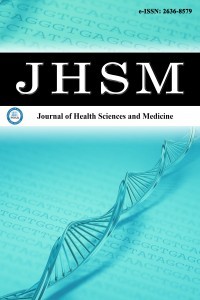1.
Rafalimanana H. World Population Ageing. Economic and SocialAffairs United Nations. 2020. 1-47 p. Available from: http://link.springer.com/chapter/10.1007/978-94-007-5204-7_6
2.
Mohanty S, Rosenthal RA, Russell MM, Neuman MD, Ko CY,Esnaola NF. Optimal Perioperative Management of the GeriatricPatient: Best Practices Guideline from ACS NSQIP® /AmericanGeriatrics Society. J Am Coll Surg. 2016;222:930-4(5):930-934.
3.
Ayan FS, Dagtekin T. Geriatrik cerrahide güncel yaklaşımlar.İstanbul Gelişim Üniv Sağ Bil Derg. 2020;12(12):460-474.
4.
Office for National Statistics. Estimates of the Very Old (includingCentenarians): England and Wales, and United Kingdom,2002 to 2014. 2015. Available from: https://www.ons.gov.uk/peoplepopulationandcommunity/birthsdeathsandmarriages/ageing/bulletins/estimatesoftheveryoldincludingcentenarians/previousReleases
5.
Partridge JSL, Moonesinghe SR, Lees N, Dhesi JK. Perioperativecare for older people. Age Ageing. 2022;51(8):1-6.
6.
Simões CM, Carmona MJC, Hajjar LA, et al. Predictors of majorcomplications after elective abdominal surgery in cancer patients.BMC Anesthesiol. 2018;18(1):1-8.
7.
Kassahun WT, Babel J, Mehdorn M. Assessing differences insurgical outcomes following emergency abdominal exploration forcomplications of elective surgery and high-risk primary emergencies.Sci Rep. 2022;12(1):1-10. doi:10.1038/s41598-022-05326-4
8.
British Geriatrics Society. Guideline for the care of people livingwith frailty undergoing elective and emergency surgery thatencompasses the whole perioperative pathway. 2021. Availablefrom: https://www.bgs.org.uk/cpocfrailty
9.
Pang CL, Gooneratne M, Partridge JSL. Preoperative assessmentof the older patient. BJA Educ. 2021;21(8):314-320. doi:10.1016/j.bjae.2021.03.005
10.
Sandini M, Pinotti E, Persico I, Picone D, Bellelli G, GianottiL. Systematic review and meta-analysis of frailty as a predictorof morbidity and mortality after major abdominal surgery. BJSOpen. 2017;1(5):128-137.
11.
Chen Y, Wang J, Liu S, et al. Development and validation of theChinese version of the quality of recovery-40 questionnaire. TherClin Risk Manag. 2020;16:1165-1173.
12.
Gornall BF, Myles PS, Smith CL, et al. Measurement of quality ofrecovery using the QoR-40: a quantitative systematic review. Br JAnaesth. 2013;111(2):161-169.
13.
Christner S, Ritt M, Volkert D, Wirth R, Sieber CC, Gaßmann KG.Evaluation of the nutritional status of older hospitalised geriatricpatients: a comparative analysis of a Mini Nutritional Assessment(MNA) version and the Nutritional Risk Screening (NRS 2002). JHum Nutr Diet. 2016;29(6):704-713.
14.
Charlson ME, Pompei P, Ales KL, MacKenzie CR. A new methodof classifying prognostic comorbidity in longitudinal studies:development and validation. J Chronic Dis. 1987;40(5):373-383.
15.
Fried LP, Tangen CM, Walston J, et al. Frailty in older adults: Evidencefor a phenotype. J Gerontol A Biol Sci Med Sci. 2001;56(3):146-156.
16.
Manekk RS, Gharde P, Gattani R, Lamture Y. Surgical complicationsand its grading: a literature review. Cureus. 2022;14(5):e24963.
17.
Dindo D, Demartines N, Clavien PA. Classification of surgicalcomplications: A new proposal with evaluation in a cohort of 6336patients and results of a survey. Ann Surg. 2004;240(2):205-213.
18.
Myles P, Weitkamp B, Jones K, Melick J, Hensen S. Validity andreliability of a postoperative quality of recovery score: The QoR-40. Br J Anaesth. 2000;84(1):11-15.
19.
Karaman S, Arici S, Dogru S, et al. Validation of the Turkishversion of the quality of recovery-40 questionnaire. Health QualLife Outcomes. 2014;12(1):1-6.
20.
Yin Y, Jiang L, Xue L. Comparison of three frailty measures for 90-day outcomes of elderly patients undergoing elective abdominalsurgery. ANZ J Surg. 2021;91(3):335-340.
21.
Aguilar-Frasco JL, Rodríguez-Quintero JH, Moctezuma-Velázquez P, et al. Frailty index as a predictive preoperative toolin the elder population undergoing major abdominal surgery:a prospective analysis of clinical utility. Langenbeck’s Arch Surg.2021;406(4):1189-1198.
22.
Than TNH, Nguyen T, Nguyen TTT, Pham T. Frailty and adverseoutcomes among older patients undergoing gastroenterologicalsurgery in vietnam. J Multidiscip Healthc. 2021;14:2695-703.
23.
Kennedy CA, Shipway D, Barry K. Frailty and emergencyabdominal surgery: a systematic review and meta-analysis.Surgeon. 2022;20(6):307-314. doi:10.1016/j.surge.2021.11.009
24.
Han B, Li Q, Chen X. Effects of the frailty phenotype on post-operative complications in older surgical patients: a systematicreview and meta-analysis. BMC Geriatr. 2019;19(1):1-9.
25.
Aceto P, Perilli V, Luca E, et al. Predictive power of modified frailtyindex score for pulmonary complications after major abdominalsurgery in the elderly: a single centre prospective cohort study.Eur Rev Med Pharmacol Sci. 2021;25(10):3798-3802.
26.
Tan HL, Chia STX, Nadkarni NV, Ang SY, Seow DCC, Wong TH.Frailty and functional decline after emergency abdominal surgeryin the elderly: A prospective cohort study. World J Emerg Surg.2019;14(1):1-7.
27.
Li JL, Henderson MA, Revenig LM, et al. Frailty and one-yearmortality in major intra-abdominal operations This study waspresented at the World Congress of Endourology in London inOctober 2015. J Surg Res. 2016;203(2):507-512. doi:10.1016/j.jss.2016.03.007
28.
Parmar KL, Pearce L, Farrell I, Hewitt J, Moug S. Influence offrailty in older patients undergoing emergency laparotomy: a UK-based observational study. BMJ Open. 2017;7(10):1-5.
29.
Oreskov JO, Burcharth J, Nielsen AF, Ekeloef S, Kleif J, GögenurI. Quality of recovery after major emergency abdominalsurgery: a prospective observational cohort study. Minerva Chir.2020;75(2):104-110.
30.
Günel B, Özşaker E. Investigation of the relationship betweenthe level of vulnerability and recovery quality of elderly patientshospitalized in the neurosurgery clinic. Ege üniversitesi; 2021.
31.
Wessels E, Perrie H, Scribante J, Jooma Z. Quality of recoveryfollowing orthopedic surgery in patients at an academic hospitalin South Africa. Anesth Analg. 2021;133(2):507-514.
32.
Chazapis M, Walker EMK, Rooms MA, Kamming D, MoonesingheSR. Measuring quality of recovery-15 after day case surgery. Br JAnaesth. 2016;116(2):241-248.
33.
Marinho R, Lusquinhos J, Carvalho B, Azevedo J, Santos A, AbelhaF. Quality of recovery after surgery for cancer treatment. RevEspañola Anestesiol y Reanim. 2018;65(8):426-433. doi:10.1016/j.redare.2018.04.012
34.
Ferraz SM, Moreira JP, Mendes LC, et al. Evaluation of the qualityof recovery and the postoperative health status after electivesurgery. Brazilian J Anesthesiol. 2018;68(6):577-583.
35.
Guimarães-Pereira L, Costa M, Sousa G, Abelha F. Quality ofrecovery after anaesthesia measured with QoR-40: a prospectiveobservational study. Brazilian J Anesthesiol. 2016;66(4):369-375.
36.
Marinho R, Lusquinhos J, Carvalho B, Azevedo J, Santos A,Abelha F. Quality of recovery after surgery for cancer treatment.Rev Española Anestesiol y Reanim. 2018;65(8):426-433.
37.
Liu C, Gao W, Zhou L, et al. Can the Tilburg Frailty Indicatorpredict post-operative quality of recovery in patients withgynecologic cancer? a prospective cohort study. Int J GynecolCancer. 2023;33(5):1-6.

